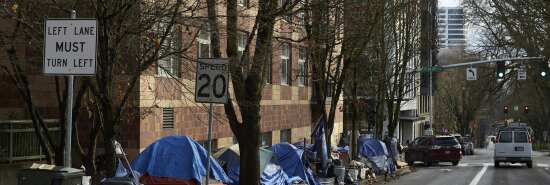
Portland’s perpetual homelessness crisis
Briana Oser
Video Embed
If you’ve ever driven into Portland, Oregon, you’ve seen the dozens of tents on the outskirts of the city. A few years ago, they were mostly concentrated there. Now, tents can be found all over the city — on major roadways, in parks, and underneath big overpasses.
In 2019, Multnomah County purchased over 22,000 tents for the homeless because of COVID restrictions inside homeless shelters. “People for Portland,” a nonprofit social organization in Portland, took a poll of 500 Multnomah County citizens this May that demonstrates how residents feel about Portland’s handling of the homelessness epidemic.
EVERY HOUSE MEMBER WHO VOTED AGAINST PASSING THE DEBT CEILING BILL
In sum, they aren’t happy. Sixty-seven percent want to see Portland implementing legal measures to encourage the homeless to seek out mental health and drug help. Fifty-five percent say, “Portland has lost what made it a special place to live.”
Portland’s homelessness problem is the worst in the nation because of drug abuse and a lack of police enforcement. Despite Portland’s liberal policies and its even more liberal voting population (48% of the voters of this poll identified as liberal), the vast majority of people included in the “People for Portland” survey opted for more legal action surrounding drug usage.
In 2019, Oregon began implementing the Drug Addiction Treatment Recovery Act to “decriminalize those with addictions.” The act also made small amounts of drugs legal for personal use. Nathan Sheppard told the Portland newspaper Willamette Week that as of mid-May, there has been a 46% increase in overdose deaths from this time last year. From 2020 to 2021, yearly opioid deaths increased from 472 to 737.
Police in Portland do not have the legal grounds to arrest those in possession of drugs or those who are publicly drugged up. Now, Portland voters are protesting: 71% of all voters and 65% of liberal voters in the poll support Portland Mayor Ted Wheeler’s proposed daytime ban on tents around schools and other public places. Portland liberals contend that the homeless deserve a place: just not around their children. This new policy would correct a bill from 2021 that intended to protect the homeless from arrest or fines if they camped out in public areas.
Cities in the United States that have a track record of improving homelessness do not simultaneously normalize drug abuse. For example, Houston’s Coalition for the Homeless attempts to place its homeless in more stable financial standing because it identifies poverty as the leading cause of homelessness. The coalition also offers educational opportunities and counseling. Houston has seen a 63% improvement in homelessness since 2011. Other cities, such as Austin and Salt Lake City, have followed suit and seen similar results.
A compassionate policy would not enable addiction. The logic that legalizes cocaine and heroin is the same liberal logic that encourages obesity and self-mutilation. We do not need to include or tolerate drug abuse in our towns. Houston is rightly reacclimating the homeless into society. When lawmakers permit sketchy transactions and opioid possession, they are also tolerating overdose and death. The decriminalization of drug abuse keeps the marginalized on the margins.
CLICK HERE TO READ MORE FROM THE WASHINGTON EXAMINER
Briana Oser is a summer 2023 Washington Examiner fellow.
